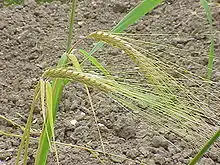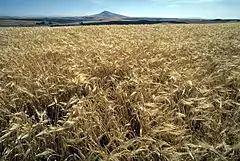Hordeum
Hordeum is a genus of annual and perennial plants in the grass family. They are native throughout the temperate regions of Africa, Eurasia, and the Americas.[5][6][7][8][9]
| Hordeum | |
|---|---|
 | |
| Hordeum vulgare f. distichon | |
| Scientific classification | |
| Kingdom: | Plantae |
| Clade: | Tracheophytes |
| Clade: | Angiosperms |
| Clade: | Monocots |
| Clade: | Commelinids |
| Order: | Poales |
| Family: | Poaceae |
| Subfamily: | Pooideae |
| Supertribe: | Triticodae |
| Tribe: | Triticeae |
| Genus: | Hordeum L.[1] |
| Type species | |
| Hordeum vulgare | |
| Synonyms[4] | |
| |
One species, H. vulgare (barley), has become of major commercial importance as a cereal grain, used as fodder crop and for malting in the production of beer and whiskey. Some species are nuisance weeds introduced worldwide by human activities, others have become endangered due to habitat loss.
Hordeum species are used as food plants by the larvae of some Lepidoptera species, including the flame, rustic shoulder-knot and setaceous Hebrew character.
The name Hordeum comes from the Latin word for "to bristle" (horreō, horrēre), and is akin to the word "horror".
Species
Species include:[4][10][11][12]
- Hordeum aegiceras – Mongolia, China including Tibet
- Hordeum arizonicum US (CA AZ NV NM), Mexico (Baja California, Sonora, Durango)
- Hordeum bogdanii – from Turkey and European Russia to Mongolia
- Hordeum brachyantherum – Russia (Kuril, Kamchatka), Alaska, Canada including Yukon, US (mostly in the West but also scattered locales in the East), Baja California
- Hordeum brachyatherum – Chile
- Hordeum brevisubulatum – European Russia; temperate and subarctic Asia from Turkey and the Urals to China and Magadan
- Hordeum bulbosum – Mediterranean, Central Asia
- Hordeum californicum – US (CA; OR; NV)
- Hordeum capense – South Africa, Lesotho
- Hordeum chilense – Argentina, Chile (including Juan Fernández Is)
- Hordeum comosum – Argentina, Chile
- Hordeum cordobense – northern Argentina
- Hordeum depressum – US (CA; OR; WA; ID; NV), British Columbia, Baja California
- Hordeum distichon – Iraq
- Hordeum erectifolium – northern Argentina
- Hordeum euclaston – Brazil, Uruguay, Argentina
- Hordeum flexuosum – Uruguay, Argentina
- Hordeum fuegianum – Tierra del Fuego
- Hordeum guatemalense – Guatemala
- Hordeum halophilum – Argentina, Chile, Bolivia, Peru
- Hordeum intercedens (bobtail barley) – California, Baja California
- Hordeum jubatum (foxtail barley) – widespread in US and Canada; Asiatic Russia, Inner Mongolia, Central Asia, Caucasus
- Hordeum × lagunculciforme – Iraq, Turkmenistan, Himalayas, western China
- Hordeum lechleri – Argentina, Chile
- Hordeum marinum (sea barley) – Europe, North Africa, southwestern and central Asia
- Hordeum murinum (wall barley) – Canary Islands, Europe, North Africa, southwestern and central Asia
- Hordeum muticum – Argentina, Chile, Bolivia, Peru
- Hordeum parodii – Argentina
- Hordeum patagonicum – Argentina, Chile
- Hordeum × pavisii – France
- Hordeum procerum – Argentina
- Hordeum pubiflorum – Argentina, Chile
- Hordeum pusillum (little barley) – widespread in Canada and US; northern Mexico, Bermuda, Argentina
- Hordeum roshevitzii – China, Korea, Primorye, Mongolia, Siberia, Kazakhstan
- Hordeum secalinum – Europe, Mediterranean, Caucasus
- Hordeum spontaneum – from Greece and Egypt to central China
- Hordeum stenostachys – Brazil, Argentina, Uruguay, South Africa
- Hordeum tetraploidum – Argentina, Chile
- Hordeum vulgare (barley) – native to the Middle East, now cultivated in many countries
Formerly included species
Botanists now regard many species as better suited to other genera:[4] Arrhenatherum, Crithopsis, Dasypyrum, Elymus, Eremopyrum, Hordelymus, Leymus, Psathyrostachys, and Taeniatherum.
References
- Linnaeus, Carl von. 1753. Species Plantarum 1: 84–85
- lectotype designated by Bowden, Wray M. (1959). "The Taxonomy and Nomenclature of the Wheats, Barleys, and Ryes and Their Wild Relatives". Canadian Journal of Botany. 37 (4): 657–684. doi:10.1139/b59-053.
- Tropicos, Hordeum L.
- Kew World Checklist of Selected Plant Families
- Flora of China Vol. 22 Page 395 大麦属 da mai shu Hordeum Linnaeus, Sp. Pl. 1: 84. 1753.
- Flora of Pakistan
- Altervista Flora Italiana genere Hordeum includes photos + distribution maps of several species
- Cabi, E.; Doğan, M. (2012). "Poaceae". In A. Güner; S. Aslan; T. Ekim; M. Vural; M. T. Babaç (eds.). Türkiye Bitkileri Listesi. Istanbul: Nezahat Gökyiğit Botanik Bahçesi ve Flora Araştırmaları Derneği Yayını. pp. 690–756.
- Pohl, R. W.; Davidse, G. (1994). "60. Hordeum L.". In G. Davidse; M. Sousa Sánchez; A. O. Chater (eds.). Alismataceae a Cyperaceae. Flora Mesoamericana. Vol. 6. México, D. F.: Universidad Nacional Autónoma de México. p. 247.
- Biota of North America Program 2013 county distribution maps
- The Plant List search for Hordeum
- "Hordeum L." Atlas of Living Australia. Archived from the original on 2015-02-01. Retrieved 2015-02-01.
- R. von Bothmer; N. Jacobsen; C. Baden; R. B. Jørgensen; I. Linde-Laursen (1995). An ecogeographical study of the genus Hordeum, 2nd ed. Rome: International Plant Genetic Resources Institute (IPGRI). ISBN 978-92-9043-229-6. Archived from the original on 2005-01-01.
- F. R. Blattner (2004). "Phylogenetic analysis of Hordeum (Poaceae) as inferred by nuclear rDNA ITS sequences". Molecular Phylogenetics and Evolution. 33 (2): 289–299. doi:10.1016/j.ympev.2004.05.012. PMID 15336664.
- F. R. Blattner (2006). "Multiple intercontinental dispersals shaped the distribution area of Hordeum (Poaceae)". New Phytologist. 169 (3): 603–614. doi:10.1111/j.1469-8137.2005.01610.x. PMID 16411962.
- F. R. Blattner (2009). "Progress in phylogenetic analysis and a new infrageneric classification of the barley genus Hordeum (Poaceae: Triticeae)". Breeding Science. 69 (5): 471–480. doi:10.1270/jsbbs.59.471.
- S. S. Jakob; A. Ihlow; F. R. Blattner (2007). "Combined ecological niche modelling and molecular phylogeography revealed the evolutionary history of Hordeum marinum (Poaceae) — niche differentiation, loss of genetic diversity, and speciation in Mediterranean Quaternary refugia". Molecular Ecology. 16 (8): 1713–1727. doi:10.1111/j.1365-294X.2007.03228.x. PMID 17402985. S2CID 46305338.
- S. S. Jakob; E. Martinez-Meyer; F. R. Blattner (2009). "Phylogeographic analyses and paleodistribution modeling indicates Pleistocene in situ survival of Hordeum species (Poaceae) in southern Patagonia without genetic or spatial restriction". Molecular Biology and Evolution. 26 (4): 907–923. doi:10.1093/molbev/msp012. PMID 19168565.
- T. Pleines; F. R. Blattner (2008). "Phylogeographic implications of an AFLP phylogeny of the American diploid Hordeum species (Poaceae: Triticeae)". Taxon. 57 (3): 875–881. doi:10.1002/tax.573016.
External links
- species of Hordeum in "Wildflowers of Israel": Spntaneous Barley, Bulbous Barley, Wall Barley, Hordeum marinum,
- Hordeum hystrix, Hordeum vulgare
